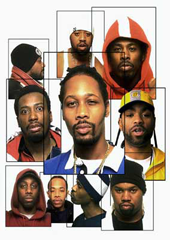Listen to This!
Wu-Tang Clan

If you think about what the Beatles did for rock 'n' roll, you understand what the Wu-Tang Clan means to the world of hip-hop. In short, they revolutionized the genre.
When they blew onto the scene in 1993, they eschewed all of rap's trends: they were nine members strong; their songs were often bereft of choruses or "hooks" (the part in a rap song that you can traditionally sing along to -- even anti-hits like NWA's "F**k the Police" have a hook); and rather than shop their demo around, they released their first single independently. The success of "Protect Ya Neck" also led to the group signing one of the most artist-friendly record deals ever, giving them tremendous amounts of creative control, and providing the freedom for each of the Clan's individual members to sign solo deals with whomever they wanted. In 1995, there were 10 Wu-Tang affiliated singles that charted in the United States, and in 1999, eight Wu related albums did the same.
Their treatment of their communities is also different from typical rap. The group's members hail from various housing projects around New York; the Wu-Tang Clan set itself apart from the barrage of "gangsta" or "reality" rappers with music that both reflected their upbringing and incorporated a much wider set of influences. While I've never been in the camp that suggests rappers (or artists in general) should shy away from discussing the less positive details of their lives or environments, there's always something slightly off-putting about the way the negative aspects of a very real gang culture are fetishized by suburban youth. The Wu-Tang Clan were frank and revealing about their real experiences, but were also more than willing to embody fictional characters and themes in song.
Samurai and kung-fu flicks, Italian mob movies, religious imagery and even seemingly disparate elements like science, mathematics and chess all weave their way through the Wu-Tang narrative. And because of that, its members maintain something that's sadly lacking in hip-hop and even in the world of rock n' roll nowadays: an air of mystery. Like Jimmy Page dabbling in the occult, Gene Simmons supposedly having a cow's tongue grafted onto his own, or the many faces of David Bowie, there's a fantastical shroud that surrounds the Wu-Tang Clan. On top of that, they're funny.
Even rappers who maintain the most fearsome of public personas aren't above cracking a joke, but the Wu-Tang effectively embrace and employ humour unlike anyone else in hip-hop (or perhaps popular music in general). There are always a number of sly one-liners in any given Wu track, but more impressive is how willing they are to participate in the theatre of the absurd. The first three videos for the W, for example, all featured the group visiting different locales and eras in a time-travelling elevator, with the clip for "Gravel Pit" taking place in what looks like a live action set for the Flintstones...with ninjas.
Major labels tend to shy away from giving away mp3s, but the Wu's official site hosts a wealth of rarities and unreleased cuts that are still an adequate introduction to the many sides of the Wu-Tang Clan:
- Wu-Tang Clan "I Can't Go To Sleep" (feat. Issac Hayes) (live)
- Ol' Dirty Bastard (w/Macy Gray) – "Don't Go Breaking My Heart" (Elton John & Kiki Dee cover)
- Ghostface Killah – "Be Easy"
- Wu-Tang Clan – "Bring Da Ruckus" (demo version)
- Wu-Tang Clan – "Triumph"
- Wu-Tang Clan – "Gravel Pit"
Quinn Omori is a regular Tyee Music Pix contributor and writes the Vancouver music blog From Blown Speakers. ![]()








What have we missed? What do you think? We want to know. Comment below. Keep in mind:
Do:
Do not: